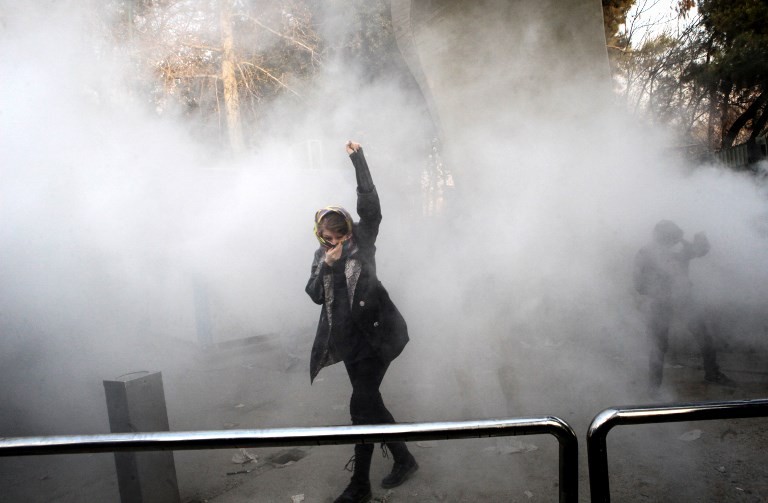Popular Reads
Top Results
Can't find what you're looking for?
View all search resultsPopular Reads
Top Results
Can't find what you're looking for?
View all search resultsUS targets Iran over deadly unrest
Washington slapped sanctions on five Iranian companies Thursday and called for an emergency UN Security Council meeting, further stepping up pressure on Tehran over the deadly unrest that has gripped the country.
Change text size
Gift Premium Articles
to Anyone
W
ashington slapped sanctions on five Iranian companies Thursday and called for an emergency UN Security Council meeting, further stepping up pressure on Tehran over the deadly unrest that has gripped the country.
The US moves came even as Iranian authorities declared an end to the turmoil, and pro-regime demonstrators rallied across the nation while officials switched focus to addressing the economic concerns that have fueled protests.
The US imposed sanctions against five Iranian firms alleged to have been working on an illegal ballistic missile program, linking the move to the protests.
"These sanctions target key entities involved in Iran's ballistic missile program, which the Iranian regime prioritizes over the economic well-being of the Iranian people," US Treasury Secretary Steven Mnuchin said.
On the streets of Tehran meanwhile, a heavy police presence lingered though there were no reports of fresh protests overnight.
Limited social media activity suggested unrest in provincial towns was also down.
Iranian state TV showed huge pro-government crowds marching across 10 cities, including Isfahan, Ardebil and Mashhad, where the protests first erupted a week ago.
"We are together behind the leader," chanted the demonstrators, in reference to supreme leader Ayatollah Ali Khamenei.
The UN Security Council was set to hold an emergency meeting on Friday afternoon to discuss the wave of protests in Iran, at the request of the United States.
Russia has criticized the US push for Iran to be discussed at the Security Council and it remained unclear if other council members would try to block the meeting via a procedural vote.
- Underlying issues -
In a bid to address grievances that drove the initial unrest, Iranian authorities were weighing options including blocking unpopular measures in President Hassan Rouhani's recent budget.
"The people's main demand now is for the government and officials to deal with the economic problems," Ali Akbar Velayati, an adviser to Khamenei, told the semi-official ISNA news agency.
The head of the army, General Abdolrahim Mousavi, thanked security forces for "putting out the fire of sedition."
A total of 21 people died and hundreds were arrested in five days of unrest that began December 28 as protests over economic woes and quickly turned against the regime as a whole, with attacks on government buildings and police stations.
- 'Grotesque intervention' -
Interior Minister Abdolreza Rahmani Fazli said 42,000 people had taken part in the unrest nationwide.
It was a higher figure than the 15,000 given by the head of the Revolutionary Guards a day earlier, but still far below the hundreds of thousands that took to the streets during the last major protest movement in 2009.
A US State Department spokeswoman said those killed and detained "will not be forgotten," after the White House warned it could impose sanctions on any officials it holds responsible.
US President Donald Trump has repeatedly tweeted his backing for the protesters, his most recent saying he has "such respect for the people of Iran as they try to take back their corrupt government."
Iranian Foreign Minister Mohammad Javad Zarif tweeted back: "Trump has an odd way of showing 'such respect.'"
"From labeling them a 'terrorist nation' and banning them from visiting the US, to petty insults on the name of the Persian Gulf," he wrote, referring to Trump's use of the term "Arabian Gulf."
US Defense Secretary Jim Mattis underscored Trump's message, saying: "The American people do not have an issue with the Iranian people. We've got a big issue with the Iranian authoritarian regime."
Russia jumped to Iran's defense, with deputy foreign minister Sergei Ryabkov telling state agency TASS: "Despite the many attempts to distort what is really going on (in Iran), I am sure that our neighbor, our friend, will overcome its current difficulties."
The question now is whether Trump will continue to waive nuclear-related sanctions suspended under the 2015 nuclear deal between Iran and world powers.
Under the deal, Trump must actively lift certain sanctions every few months and the next deadline falls on January 12.
Iran -- which has long accused the United States and Sunni Arab rivals led by Saudi Arabia of interference in its affairs -- said external "enemies" were behind recent unrest.
Online messaging and photo sharing platforms Telegram and Instagram remained blocked on mobile phones, having been interrupted soon after protests began.
- Parliament responds -
Iran's political establishment has closed ranks against the unrest, with even reformists condemning the violence.
But many have also called on Rouhani to address the economic issues that drove the initial protests.
There have already been moves in parliament to block the unpopular budget measures announced last month, which included cuts to welfare and fuel price hikes.
Rouhani came to power in 2013 promising to mend the economy and ease social tensions, but high living costs and unemployment have left many feeling that progress is too slow.
Rural areas, which have seen years of drought and under-investment, are particularly hard-hit.
In the capital, there is widespread sympathy with the economic discontent fuelling the unrest, particularly an unemployment rate that is officially close to 30 percent for young people.
But some Tehranis said US claims they were desperate for freedom were overblown.
"If the people of Iran have something to say, it's about economic problems. They want to see their demands, what they voted for, fulfilled," Hamid Rahimi, a 33-year-old bank employee, told AFP.










